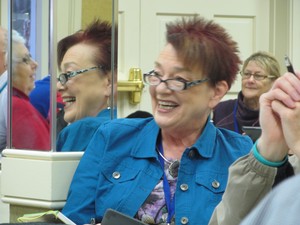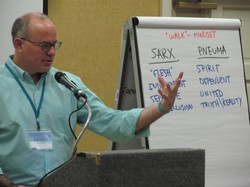The kingdom of God is never in trouble, so those who live in the Spirit aren’t either, James Bryan Smith told the Presbyterian Church (U.S.A.)’s Disciple-Making Conference here today (Jan. 22).
Smith said two “power narratives rooted in Jesus Christ are the answers to the two questions every human asks: ‘Am I significant?’ and ‘Am I safe?’”
Those “power narratives” are:
- “I am one in whom Christ dwells and delights”
- “I live in the strong and unshakeable kingdom of God”
Continuing the emphasis in his series of keynotes here on the role of narrative/story, spiritual practices and communities of faith in transforming individuals and the church, Smith said, “The truth is that we live at the mercy of our ideas and when you develop a narrative, it will run and often ruin your life. That’s why we need to bring the true narratives about God so the light can overcome the darkness.”
It’s not easy, Smith conceded, noting that competing narratives about God and existence date back to the garden of Eden story in Genesis. “The devil’s purpose in that story was (and is) to cast doubt on what God really said and then to cast doubt on God’s self and finally to offer authorship of your own life.
“The created trying to become the creator is the fundamental struggle of our existence,” Smith said. But, he continued, “Our powers are weak. That’s a fundamental truth that we like to forget and don’t want to even think about.”
The Apostle Paul used the Greek words “sarx” and “pneuma” to characterize the competing narratives people face, Smith explained. Sarx, loosely translated as “flesh,” is typified by independence from God, separation from others, and the resulting lies and illusions. Pneuma, translated as “spirit,” is characterized by dependence on God, unification with others and creation and the truth and reality of God’s kingdom.
The sarx narrative assumes “that the only resources you have are you,” Smith said, “and so creates a void that must be filled ― the big three being sex, money and power. But filling that void always manifests in some sort of sin and ultimately a ruined life.”
Pneuma, on the other hand, Smith said, means “putting ourselves in service of the Holy Spirit, to be taught the truth, casting out the toxic narratives about ourselves and other people, and replacing false narratives with true narratives, even in difficult times.”
Destructive sarx behaviors such as anger, scapegoating, lying, lust, hatred and a host of others “are not necessary on the pneuma side because you are not threatened,” Smith said. “The spirit reminds us of who we are, that our identity is in Jesus Christ.”
The cost of discipleship is high, Smith conceded, “but the cost of non-discipleship is even higher.

Participants enjoy a light-hearted moment at disciple-making church conference —Paul Seebeck
“Jesus spoke more than 100 times about the kingdom of God ― God’s power, protection and provision for all the things that we need,” Smith said. “It is THE reality in which we live and it changes everything.”
What is needed in the world today, he said, “is a vision of what our lives can be: a story with a beginning, a long middle and no end. It is a story of abiding peace, boundless love, hope that endures even in discouraging circumstances, life that is blessed despite your own failures.
“To move into that life we need the vision, the intention (to pursue it) and the means to make it a reality,” he said, using the acronym VIM. “Our job is to cast that vision. If the vision is strong enough people will find the means to achieve it.”
God is with us, Smith assured the 100 conference participants. “And the kingdom of God is never in trouble, so neither are we.”

